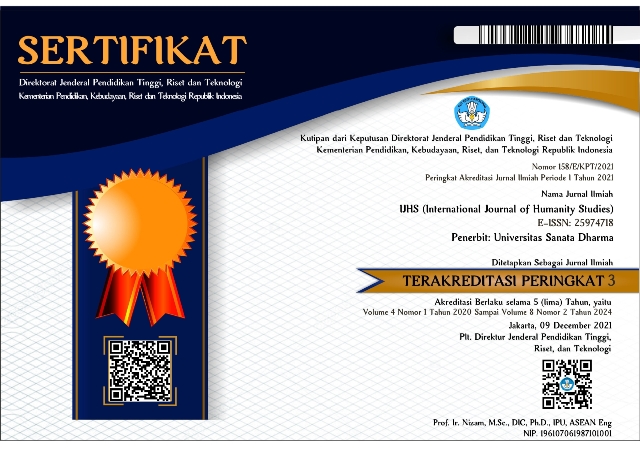THE PHONOLOGICAL ANALYSIS OF A JAPANESE SINGER: THE CRITICISM OF USING SONGS IN ENGLISH TEACHING
Abstract
This study deals with the phonological analysis of a Japanese singer in some English sounds in live performance music videos. It aims to analyse and describe the pronunciation process of Japanese singer in producing tense vowels, diphthongs, and liquids. It also criticizes the use of songs in English teaching based on the findings. The data are from live performance videos of Japanese singer. The researcher watched and listened to the videos. After that, the researcher listed the words in the lyrics of the songs containing tense vowels, diphthongs, and liquids. The words were transcribed into standard phonetic transcription. Then, the researcher transcribed the words into the phonetic transcription according to the pronunciation of the singer. After that, the data were classified into three parts which were the words containing tense vowels, diphthongs, and liquids. After the researcher analyzed the videos, the findings of this study showed that the Japanese singer as an EFL speaker had different pronunciation process in producing tense vowels, diphthongs, and liquids sound. The findings also gave the criticism on the use of songs in English teaching in a form of caution and contribution.
Keywords
Full Text:
PDFReferences
Akamatsu, T. (1997). Japanese phonetics: Theory and practice. Mnchen: Lincom Europa.
Ary, D., Jacobs, L. C., & Razavieh, A. (2002). Introduction to research in education. (6th ed.). Belmonth, CA: Wadsworth/ Thomson Learning.
Avery, P., & Ehrlich, S. (1992). Teaching American English pronunciation. Oxford: Oxford University Press.
Crystal, D. (2003). English as a global language. (2nd ed.). Cambridge: Cambridge University Press.
Fromkin, V., Rodman, R., & Hyams, N. (2003). An introduction to language. Massachusetts: Thompson Cooperation.
Jenkins, J. (2000). The phonology of English as an international language. Oxford: Oxford University Press.
Kenworthy, J. (1987). Teaching English pronunciation. London: Longman.
Kramer, D. J. (2007, January 11). Using songs in teaching English classrooms. Retrieved on October 6, 2017, from http://www.topenglishteaching.com
Ladefoged, P. (1982). A course in phonetics. New York: Harcourt Brace.
McMahon, A. (2002). An introduction to English phonology. Edinburgh:
Edinburgh University Press.
Nathan, G. S. (2008). Phonology: A cognitive grammar introduction. Philedephia: John Benyamin Publishing.
Nation, I.S.P., & Newton, J. (2009). Teaching ESL/EFL listening and speaking. New York: Routledge.
Ohata, K. (1994). Phonological differences between Japanese and English: several potentially problematic areas of pronunciation for Japanese ESL/EFL learners. Pennsylvania: Indiana University of Pennsylvania Press.
Okada, H. (1991). Journal of the international phonetic association. Japanese, 21(2), 9496.
Paul, D. (2003). Teaching English to children in Asia. New York: Longman.
Philip, S. (1993). Young learners. China: Oxford University Press.
Roach, P. (2009). English phonetics and phonology: A practical course. Cambridge: Cambridge University Press.
Smith, B. (2012). Pronunciation patterns of Japanese learners and their implications or teaching. Polyglossia, 23, 202.
Suski, P.M. (1931). The phonetics of Japanese language. Routledge Library Edition. vol. 59. London: Routledge.
Tsujimura, N. (2007). An introduction to Japanese linguistics. (2nd ed.). MA: Blackwell Publishing.
Vance, T. (1987). An introduction to Japanese phonology. Albany: State University of New York Press.
Veen, L. V. D., & Mve, P. M. (2010). Theory and practice of data collection for phonological. Leiden: 3L Sumer School.
DOI: https://doi.org/10.24071/ijhs.v2i1.1574
Article Metrics
Abstract view : 1988 timesPDF view: 1128 times
Refbacks
- There are currently no refbacks.
Copyright (c) 2018 Barli Bram
Indexed and abstracted in:
IJHS Sinta 3 Certificate (S3 = Level 3)
International Journal of Humanity Studies (IJHS) has been nationally accredited Sinta 3 by the Ministry of Education, Culture, Research and Technology of the Republic of Indonesia based on the decree No. Surat Keputusan 158/E/KPT/2021. Validity for 5 years: Vol 4 No 1, 2020 till Vol 8 No 2, 2024

This work is licensed under CC BY-SA.
Creative Commons Attribution-ShareAlike 4.0 International License.
p-ISSN: 2597-470X (since 31 August 2017); e-ISSN: 2597-4718 (since 31 August 2017)
International Journal of Humanity Studies (IJHS) is a scientific journal in English published twice a year, namely in September and March, by Sanata Dharma University, Yogyakarta, Indonesia.
Note: The opinions expressed in this publication are those of the authors. They do not purport to reflect the opinions or views of the editorial team or publishers.


















